Top 5 Mistakes In SEO For Rental Property That Kill Your Rankings
by
Jeremy Tang - Updated
13-Dec-2024

SEO for rental property hinges on avoiding critical mistakes that harm rankings. Use hyper-local SEO with neighborhood-specific keywords, implement schema markup for rich search snippets and ensure mobile optimization. Enhance credibility with user reviews and conduct regular SEO audits.
In the crowded rental property market, competition can be relentless. With nearly 19.3 million rental properties in the U.S. alone (Source: Bankrate) and another 10.9 million in Australia (Source: Australian Bureau of Statistics), it’s easy to feel lost in the shuffle.
But here’s how you can rise to the top: hyper-local SEO.
Almost everyone – 97% of consumers, to be exact – turns to online searches when they’re looking for local services (Source: Pronto Marketing). If your property listing isn’t optimized for the precise neighborhoods where renters are searching, you’re practically invisible.
Hyper-local SEO gives you the edge by ensuring your listings appear where and when prospective renters are looking. It’s about targeting specific neighborhoods, not just broad cities. For example, someone might search “studio apartments in Brooklyn Heights” rather than “rentals in New York City.”
Without good local SEO services by your side, your perfectly positioned Brooklyn Heights listing might never cross their radar.
Broad keywords like “rental property” or “apartments for lease” are SEO gold. That is, if you have a multimillion-dollar budget at your disposal.
The unfortunate reality is, because broad terms are highly sought-after, smaller businesses likely won’t be able to make a mark trying to compete for them. And even if you do manage to get the promise of higher traffic from these keywords, how much of it will actually translate to profits?
Here’s the problem: These terms miss what your renters actually want.
You see, when people search for rentals, they’re likely hunting for specifics, like:
Plus, when someone searches for something specific, like “studio apartments near Sydney Opera House,” they’re probably ready to sign a lease. Basically, these high-intent searches are where you should focus your energy if you want to grab the attention of people who are most likely to spend money.
Neighborhood-specific terms like “affordable apartments Harlem” are like breadcrumbs leading searchers straight to your listing.
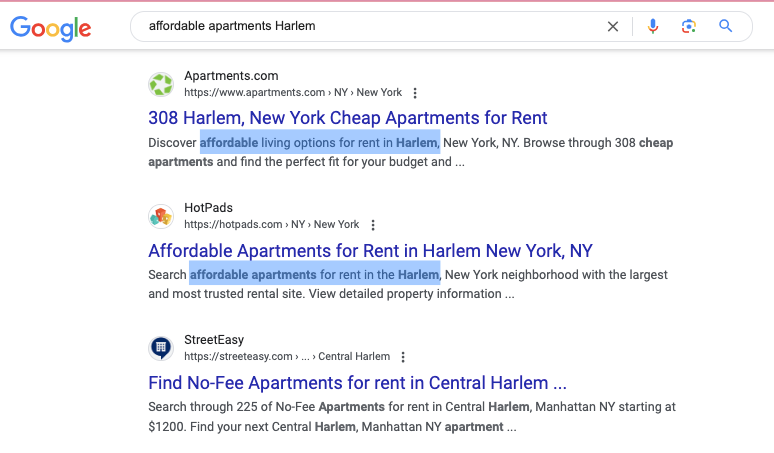
Our advice? Sprinkle these terms into your metadata and content. You can even talk about nearby landmarks, parks or unique hotspots. This resonates with renters and signals to search engines that your listing has geographic relevance, resulting in higher rankings, better visibility and more qualified leads.
A local SEO keyword reference bank can be your roadmap to attracting hyper-local traffic and maximizing your online presence. To help you create your own reference bank, you can make use of Area Ten’s ready-made template. 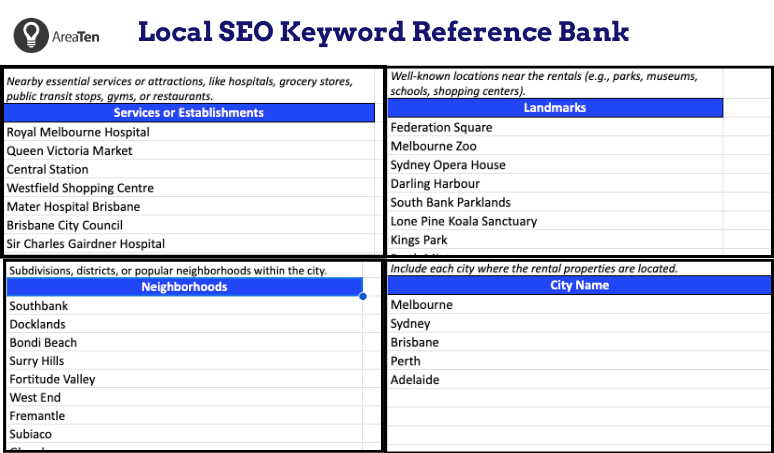
Download your own copy here: Local SEO Keyword References Bank
Here’s how to make the most of this template:
Schema markup is like giving search engines a cheat sheet for your website’s content.
When applied to rental listings, it organizes critical information like property types, pricing and availability into a structured format. This structured data allows search engines to present your listings via rich snippets, which display additional details like star ratings or unit availability.
And thanks to these eye-catching details, it becomes much more likely for your listings to draw attention and clicks. Skip this step, and you risk falling behind competitors whose listings look more polished and renter-friendly.
What’s more, using schema types like “RentalProperty,” “Offer” and “Vacation Rental” can make your listings more appealing and informative.
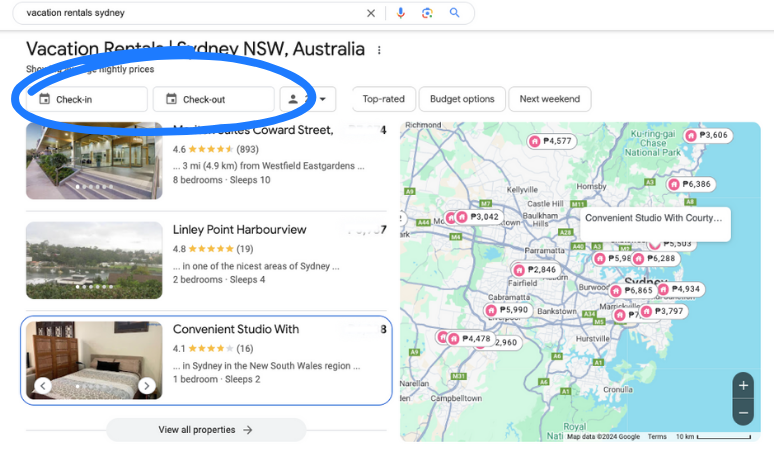
Here’s a step-by-step breakdown of how you can add schema markup to your listings and ensure search engines understand your property details clearly.
Begin by heading over to the Google Structured Data Markup Helper. Once there. select the type of data to mark up. For rentals, “Product” or “Local Business” works well if “RentalProperty” isn’t an option.
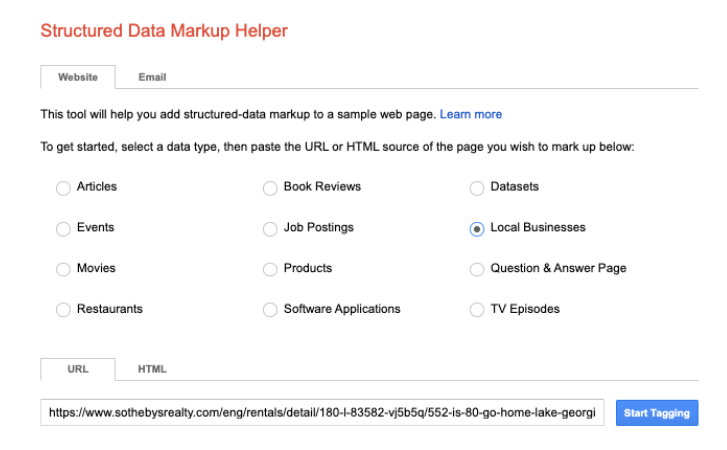
If you already have a rental property page ready, you can either enter its URL or paste the HTML directly into the tool. Highlight key info like:
The tool will guide you in tagging everything properly and generate structured data as you go.
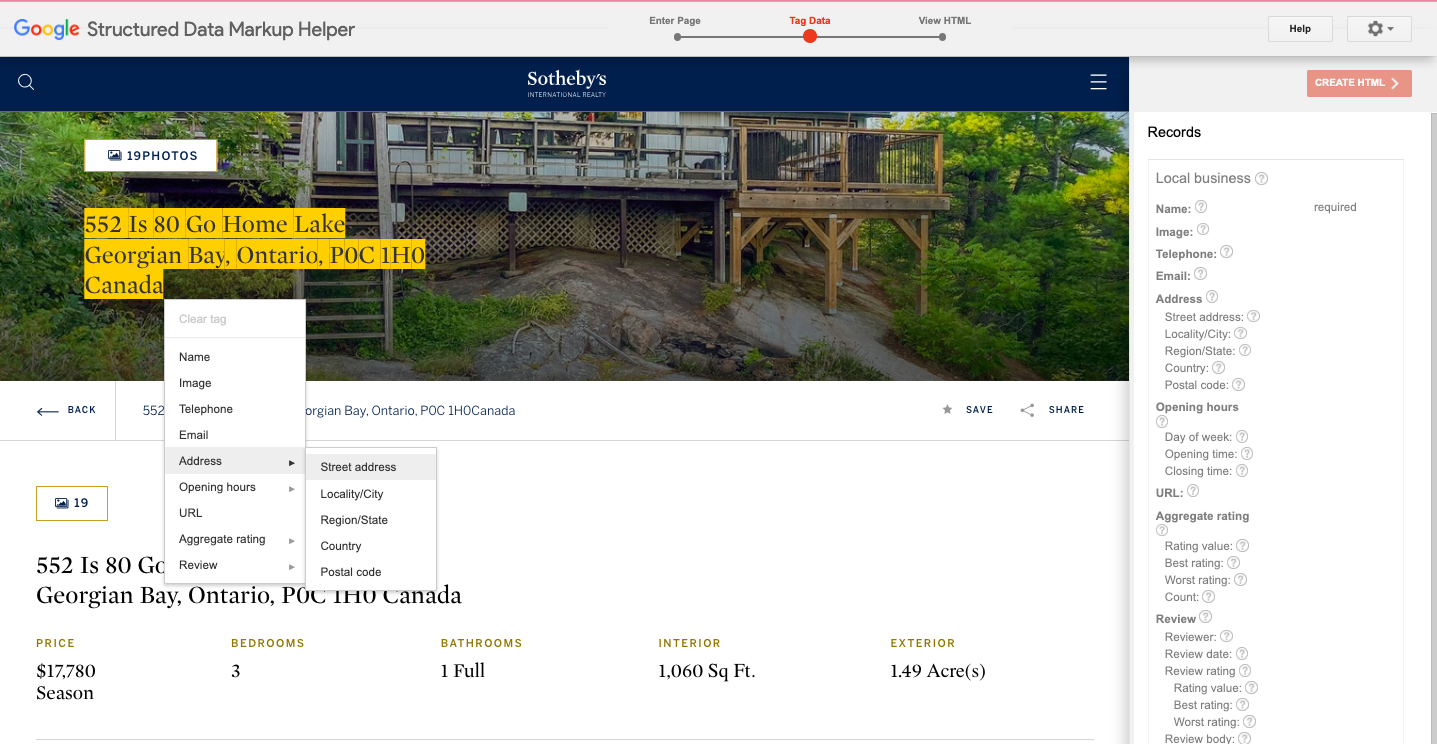
When you’re done tagging, the tool will produce the JSON-LD code. Copy it and paste it into the <head> section of your site’s HTML, and that’s it – your listings are now speaking search engine language.
Before you celebrate, it’s a good idea to run your new markup through Google’s Rich Results Test. This ensures your schema is error-free and ready to boost your search visibility.
If you’re looking for a faster approach, tools like ChatGPT can simplify this even further. Just provide the property details (name, price, location, availability, etc.), and it will generate tailor-made JSON-LD code for you.
Need extra guidance? Check out this guide on schemas you can use to get up and running.
With 57% of local searches now happening on smartphones and tablets (Source: Forbes), it’s crucial for any website these days to be mobile-friendly.
Here’s another key point to consider: renters on the move are often on the brink of making a decision, as they’ll be out scheduling viewings, calling property managers or comparing listings. If your site isn’t optimized for mobile, you’re essentially closing the door on these potential leads right when they’re ready to take action.
Below are some best practices to keep in mind:
Because mobile is so prevalent today, search engines like Google have made it a point to implement mobile-first indexing in SEO, favoring mobile-friendly sites, especially for “near me” searches. If your rental property site isn’t ready for mobile users, you can say goodbye to top rankings and renters searching for places in your area.
Here’s the hard truth: if your website doesn’t load quickly, fit neatly on a screen or have buttons that can actually be clicked without needing a magnifying glass, Google won’t see it in the best light. And who can blame them? Why would they rank a site that will just end up frustrating the majority of users?
Of course, this isn’t just a “Google problem” either – it’s a renter problem.
Imagine a potential tenant scrolling through listings. They find yours, and your site happens to be a mess. What happens next? They’ll leave immediately and probably find your competitor, whose site works like a dream on mobile.
So, what’s the fix? It’s not rocket science:
Core Web Vitals are the metrics that Google uses to measure how users experience your site. They include:
If you’re serious about providing a smooth mobile browsing experience for renters, optimizing these metrics isn’t optional.
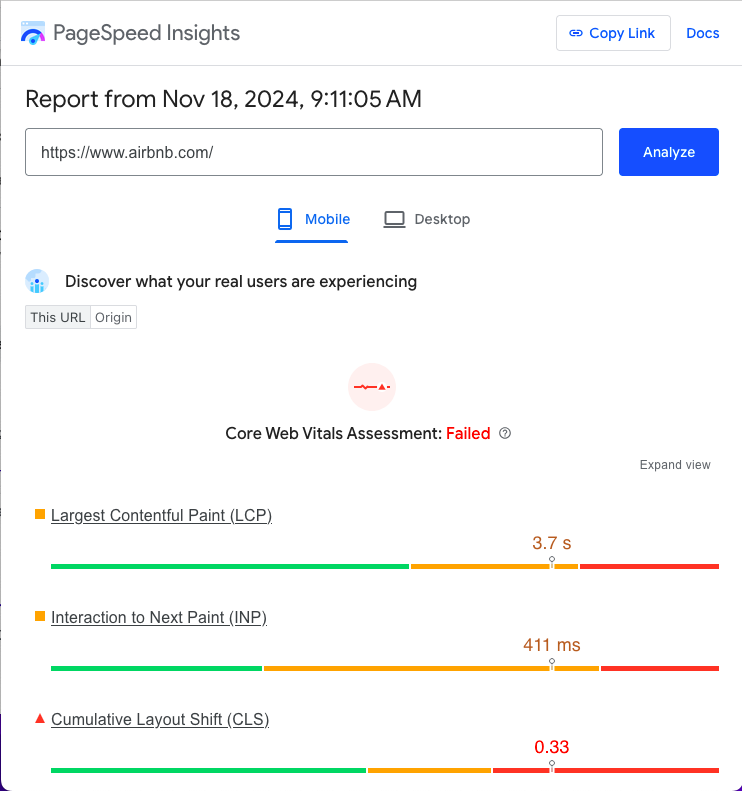
Tools like PageSpeed Insights are your best friend here. Plug in your rental property site URL, and you’ll get a detailed report that zeroes in on mobile-specific performance. From there, you can prioritize improvements based on the insights provided, ensuring your site loads quickly, responds seamlessly and maintains visual consistency across devices.
To ensure your site meets the expectations of today’s mobile users – and earns top marks from PageSpeed Insights – start by nailing the fundamentals:
User-generated reviews have become a cornerstone of property management SEO. Why? Because they bring an unparalleled level of authenticity and trust to your listings.
Glossy pitches from landlords or property managers are great, but prospective renters usually don’t settle for just those. They want to know what it’s like to live there from the people who’ve actually experienced it.
Positive reviews serve as endorsements for your property, speaking directly to potential tenants’ biggest concerns: Is maintenance reliable? How responsive is the landlord? What’s the neighborhood vibe?
These are the questions renters need answered before they make a decision, and reviews can fill in those gaps more effectively than any promotional copy ever could.
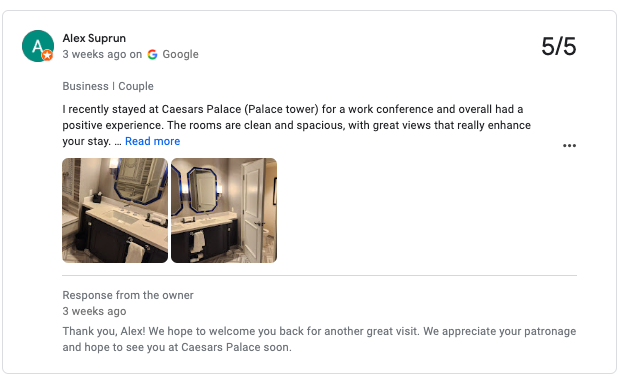
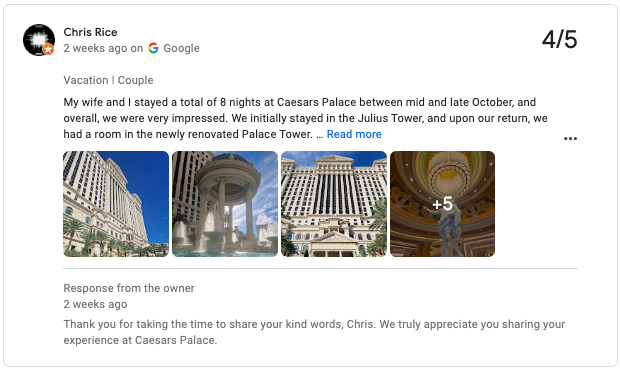
Apart from building trust, user-generated reviews also work wonders for your SEO in different ways. Here’s how:
Showcasing positive feedback on your website and social media is a surefire way to grab attention and expand your reach.
Highlighting glowing tenant experiences adds authenticity and builds trust – exactly what potential renters are looking for. Sprinkle in a few quotes or testimonials right into your property descriptions, and suddenly those listings are on a whole new level with relatable stories that stick in people’s minds.
But why stop there? Turn those positive reviews into powerful marketing tools. Use them to craft case studies or neighborhood guides that show off what makes your properties unique. You’re telling the story of satisfied tenants while also spotlighting the perks of living in your spaces, whether it’s the quiet street, lovely views or amazing amenities.
Making it easy for tenants to leave reviews is a game-changer for gathering feedback and building trust. Here’s how to set up a system that gathers reviews while making the process frictionless for your tenants and impactful for your local SEO for property management:
Overlooking the necessity of regular SEO audits is like ignoring routine maintenance on a rental property – it’s a surefire way to let value slip through the cracks. In fact, this is exactly why many tourism SEO strategies fail, as well as tactics for other types of businesses.
Imagine your site as a high-performing engine. Without regular tuning, small issues like slow page load times or broken links can snowball, holding back your search rankings and making it harder for potential renters to find you. But when you conduct audits consistently, you identify and fix problems early, ensuring your site is optimized and competitive.
However, a cookie-cutter SEO audit won’t cut it. After all, your rental business has unique goals and challenges.
Tailoring your audits to align with these specifics ensures you’re focusing on what truly impacts your visibility and leads. For example, while a generic audit might highlight keyword gaps, a tailored one for rentals could uncover localized SEO opportunities critical for reaching renters in specific markets.
When auditing a rental property website, focus on these key elements:
For further guidance, you can check out our tailored SEO audit checklist.
When it comes to scaling SEO for apartments and other rental properties, speed and precision are everything.
That’s where Area Ten’s CMAX platform comes in. Unlike conventional solutions, CMAX crafts unique, brand-consistent pages that target specific geographic markets, ensuring your properties are found by the right audiences in the right places.
So, why wait? Inquire today about our FREE SEO Fast Track to transform your SEO strategy and accelerate your growth in ways you never thought possible.
Book a free video consultation below to see how your SEO & Paid Media campaigns are performing against global benchmarks in your industry.
We’ll uncover tangible opportunities to grow your business in just 6 weeks, including: